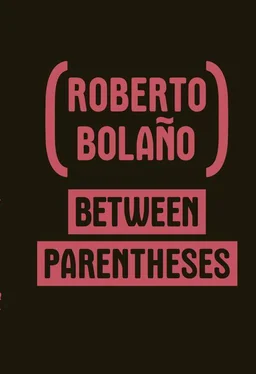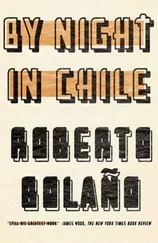Roberto Bolaño - Between Parentheses - Essays, Articles and Speeches, 1998-2003
Здесь есть возможность читать онлайн «Roberto Bolaño - Between Parentheses - Essays, Articles and Speeches, 1998-2003» весь текст электронной книги совершенно бесплатно (целиком полную версию без сокращений). В некоторых случаях можно слушать аудио, скачать через торрент в формате fb2 и присутствует краткое содержание. Год выпуска: 2011, Издательство: New Directions, Жанр: Публицистика, Критика, на английском языке. Описание произведения, (предисловие) а так же отзывы посетителей доступны на портале библиотеки ЛибКат.
- Название:Between Parentheses: Essays, Articles and Speeches, 1998-2003
- Автор:
- Издательство:New Directions
- Жанр:
- Год:2011
- ISBN:нет данных
- Рейтинг книги:4 / 5. Голосов: 1
-
Избранное:Добавить в избранное
- Отзывы:
-
Ваша оценка:
- 80
- 1
- 2
- 3
- 4
- 5
Between Parentheses: Essays, Articles and Speeches, 1998-2003: краткое содержание, описание и аннотация
Предлагаем к чтению аннотацию, описание, краткое содержание или предисловие (зависит от того, что написал сам автор книги «Between Parentheses: Essays, Articles and Speeches, 1998-2003»). Если вы не нашли необходимую информацию о книге — напишите в комментариях, мы постараемся отыскать её.
The Savage Detectives
Between Parenthese
Between Parentheses: Essays, Articles and Speeches, 1998-2003 — читать онлайн бесплатно полную книгу (весь текст) целиком
Ниже представлен текст книги, разбитый по страницам. Система сохранения места последней прочитанной страницы, позволяет с удобством читать онлайн бесплатно книгу «Between Parentheses: Essays, Articles and Speeches, 1998-2003», без необходимости каждый раз заново искать на чём Вы остановились. Поставьте закладку, и сможете в любой момент перейти на страницу, на которой закончили чтение.
Интервал:
Закладка:
TOMEO
There’s a new novel out by Javier Tomeo and his fans are rubbing their hands in glee. The novel is called Napoleon VII and inevitably, of course, it’s about a madman who thinks he’s Napoleon and who watches from a balcony as his soldiers gradually gather at the door to his house. (In a way, the character is reminiscent of the madman from El canto de las tortugas [The Song of the Turtles], who thought he could talk to animals.) Here the madman, Hilario, thinks he can talk to his left big toe, which is sometimes Murat, sometimes Soult, and sometimes Napoleon’s ill-starred secretary. Hilario, naturally, is the loneliest man in the world, a man who listens to the television so as not to feel alone, and who thinks when he watches it that he’s receiving signals beamed exclusively to him. The other character, the other voice lost in this Napoleonic dream, is Hilario’s cross-dressing neighbor, who, dressed as Josephine, is preparing for a date that night with Napoleon VII and who recklessly — that is, in a way that leaves room for hope — addresses himself directly to the abyss. Two typical Tomean characters, created by an author whose novels can in principle be divided into two categories: those featuring a dialogue between two dissimilar beings, linked only by loneliness (a dialogue that often ends up becoming an anguished monologue that leads, in the blink of an eye, to the edge of reason), and those in which there is only one character, someone who has generally lost his sanity or what the world deems sanity. Tomeo’s eye wanders, in a fashion perhaps uncommon in Spanish literature, through the hell of the everyday and also through its unexpected (because familiar) verbal paradises, offering us a starkly real picture of our capacity for endurance.
MEMOIRS
Of all books, memoirs are the most deceitful because the pretense in which they engage often goes undetected and their authors are usually only looking to justify themselves. Self-congratulation and memoirs tend to go together. Lies and memoirs get along swimmingly. No memoirist (though exceptions do exist) has ever been known to speak ill of himself or poke fun at himself or coldly recount an embarrassing episode from his life, as if nothing embarassing had ever happened to him. No memoirist has ever boasted of his cowardice. In fact, memoirists aren’t just brave, they usually live in the eye of the storm, or have passed through it. The most flagrant example of this kind of memoirist in recent literary history is Pablo Neruda and his deplorable Memoirs . Occupying a somewhat different position is Ernesto Sábato’s last book, Antes del fin [Before the End] (Seix Barral), published after more than twenty years of silence. For a reader of Sábato, the truth is that the book lacks flavor — or, rather, for a reader who hasn’t already resigned himself to the fact that Sábato wrote only three novels and will probably never write anything else. The first thing one notices is its length: it’s just 188 pages long, skimpy for a memoir, by any measure. But later, as the reader makes some headway into what is in no way a strident book, he realizes that 188 pages is enough and even too much to say what must be said, in other words that unhappiness still exists and that utopia can also exist, that we breathe and that we stop breathing. And that’s all Sábato thinks he has to tell us.
SPRINGTIME IN BLANES
Spring comes to Blanes, the season that makes us all equals, and even the town’s most disagreeable residents attempt not a smile but a different kind of gaze, as if spring were a spinster machine, in other words a machine incomprehensible in principle, incontrovertible, that comes to town from who knows where, maybe the sea, maybe the mountains, maybe the fields where black men and white men work hard planting who knows what and they stop in the middle of a row or in the middle of digging in the same way that the most disagreeable townspeople stop at a corner suddenly swarming with flies to watch the arrival of spring, the spinster machine that children, even the most disadvantaged children, understand better than adults, and that’s it, there’s nothing else to discuss, spring comes to town and Blanes becomes Blanes Ville or Blanes sur Mer, as Joan de Sagarra would say, our imaginary little city, our city in thrall to the whims of the spinster machine that came from somewhere though no one knows where, surely not from the sea, because even the sea seems surprised by its arrival, and in fact, if you think about it (in other words, if you start to think like a spinster machine), spring seems to have come in from the tower of Sant Joan, which is, along with the Gothic fountain, the only structure in town that remains unperturbed, as if the four seasons coexisted in its molecular makeup, and it’s this tower that some residents of Blanes feel is the perfect gateway not only for the arrival of spring but for many other things, an eschatological page by Joaquim Ruyra, for example, or the reddest shrimp on the Costa Brava, or the joy of being alive with no need for further discussion.
CHILEAN LITERATURE
Quiet days in Blanes. I’m teaching a course on new Chilean fiction. I’m the teacher of the course and the only student in the course. Which is fine. Although sometimes my laziness as a student horrifies me and sometimes my clumsiness as a lecturer brings on sudden fits of sleep. These fits are called narcolepsy, which is what River Phoenix had in that Gus Van Sant movie. But River Phoenix also had Keanu Reeves, or to put it another way: Phoenix had a place to rest his weary head and I can only rest mine on books. And books, especially if one mistakes them for pillows, can cause nightmares. Despite it all, I sleep and read. Chilean literature, I say to myself in my sleep, is an endless nightmare: for so many writers, for so many critics, for so many, many readers. The presence of the nightmare wakes me all of a sudden and I go out. It’s seven in the evening. I go to the bank and a man with a cane cuts in front of me when I open the door. I know who he is. Once he threw a beer mug through the window of a bar. Will you hold the door for me? he asks. Of course, I say. And while I’m getting money from the automatic teller, the man with the cane stands in a corner, poring over his savings book. When I leave, he says goodbye and I decide not to reply. I don’t like people who read their savings books like novels. And yet, the man with the cane is a relatively cultured person. Once, at a different bar, he talked to me about Peter Pan. He was drunk and he said that a long time ago he had been rich and he cried. River Phoenix would have made a good Peter Pan, I think as I walk away from the bank, and then I think some more about new Chilean fiction. New, say, from Manuel Rojas onward. Before I realize it, my feet take me to a store that sells games. The owner’s name is Santi and he’s my friend and I owe him three thousand pesetas. Of course: that was why I went to the bank to get cash. The store is full and only Santi is working. Instead of helping him, I stand in a corner, like the man with the cane, and watch the people. Most are kids buying video games. I feel worse and worse. I close my eyes. Suddenly I hear someone talking with an unmistakably Chilean accent. I open my eyes and discover a trio composed of a horrible adolescent with a neutral accent, his mother, who speaks with a kind of Colombian accent, and a man with very black hair, who was the first to speak and who is Chilean. All three are wearing tight pants and boots. All three are short. The adolescent is smoking. He looks tough and doesn’t seem too bright, but he can’t hide the fact that he’s a child. His mother, the Colombian, must be about forty, maybe younger, and she really does have a hard face, but now she seems at peace. The Chilean is with the Colombian, but it’s clear he isn’t the kid’s father, he must be thirty, if that, and he’s as interested or more interested than his stepson in buying games. They seem, the three of them, like recent arrivals from hell. Ready (the Colombian woman) to cook a good meal that night and ready (her two boys) to spend a week playing video games. I think about Guy Debord and the Situationists. I think about virtual reality and the new Chilean novel. Santi shows me a new computer game. I take a look at it, it’s called Settlers and must be similar to Age of Empires. I pay him what I owe and leave. On the way home I buy honey and camomile tea. I’m back at my apartment. I’m back in my seminar. I read. I listen to the noises from the street. I fall asleep and dream about a book that is a map of wakefulness and sleep. Then I open my eyes in the dark and on the wall, like Mount Rushmore, I see the faces of the cripple and the diabolical threesome. What writers do the survivors read? I ask aloud. Those hypocrites, my own kin.
Читать дальшеИнтервал:
Закладка:
Похожие книги на «Between Parentheses: Essays, Articles and Speeches, 1998-2003»
Представляем Вашему вниманию похожие книги на «Between Parentheses: Essays, Articles and Speeches, 1998-2003» списком для выбора. Мы отобрали схожую по названию и смыслу литературу в надежде предоставить читателям больше вариантов отыскать новые, интересные, ещё непрочитанные произведения.
Обсуждение, отзывы о книге «Between Parentheses: Essays, Articles and Speeches, 1998-2003» и просто собственные мнения читателей. Оставьте ваши комментарии, напишите, что Вы думаете о произведении, его смысле или главных героях. Укажите что конкретно понравилось, а что нет, и почему Вы так считаете.












